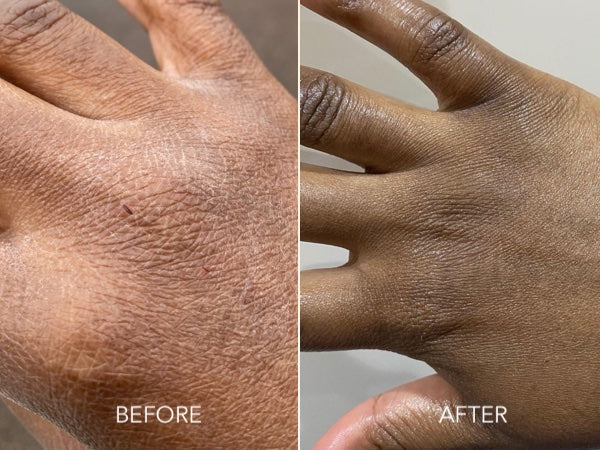
Eczema vs Dry Skin. What's the difference?
Share
When it comes to skin health, understanding the difference between dry skin and eczema is essential for choosing the right treatments and managing symptoms effectively. Although both conditions can cause discomfort, itchiness, and irritation, they have distinct characteristics and require different approaches to care. Let’s delve into what sets these two apart.
What Actually Is Dry Skin?
Dry skin, scientifically known as ‘xerosis’, occurs when the skin lacks sufficient moisture. This can happen due to a variety of factors, such as:
- Weather Conditions: Cold, dry air in winter can strip the skin of its natural oils.
- Ageing: As we age, our skin produces less oil, leading to dryness.
- Hot Showers: Prolonged hot showers can remove the skin’s natural oils.
- Harsh Soaps and Detergents: Products with strong chemicals can deplete the skin’s moisture barrier.
- Dehydration: Not drinking enough water can also contribute to dryness.
Common symptoms of dry skin include rough, scaly, or flaky patches, tightness (especially after bathing or using harsh cleansers), redness, and irritation. Thankfully, our new in shea body balm is gentle and won’t strip your skin of its natural oils.
How to Manage Dry Skin
Keeping your skin soft, supple, and moisturised is a priority, especially in the UK, where fluctuating weather takes its toll. Here are some tips:
- Moisturise Regularly: Our Shea Butter Balm with natural oils and essential oils works wonders when applied overnight. You’ll wake up with revitalised skin.
- Avoid Hot Water: Opt for lukewarm baths or showers.
- Stay Hydrated: Drinking plenty of water throughout the day will help maintain your skin’s moisture levels.
What Is Eczema?
Eczema is a chronic inflammatory skin condition linked to genetic and environmental factors. Common triggers include:
- Allergens: Such as pollen or dust.
- Irritants: Including soaps, detergents, and perfumes.
- Climate: Extreme temperatures and humidity can worsen symptoms.
- Stress: A significant trigger that can aggravate eczema.
Symptoms of eczema may include:
- Intense itchiness.
- Red or brownish patches.
- Thickened, scaly skin.
- Small raised bumps that may leak fluid.
- Crusting and oozing.
- Swollen, sensitive skin.
How to Manage Eczema
While eczema can’t be cured, it can be effectively managed with lifestyle changes and treatments:
- Moisturise Frequently: Our Shea Butter is a miracle balm for eczema. The founders daughter, whose daughter has eczema, swears by it for soothing and improving her little one’s skin.
- Medications: Topical corticosteroids or other prescribed treatments may be necessary. Consult your doctor.
- Bathe Properly: Use lukewarm water and mild, fragrance-free cleansers to avoid irritation.
- Choose Soft Fabrics: Cotton or other gentle fabrics reduce irritation.
What’s the Difference Between Eczema and Dry Skin?
While symptoms may appear similar, there are significant differences between the two:
- Cause: Dry skin is primarily caused by environmental factors and dehydration, whereas eczema is a chronic condition with genetic and immune components.
- Duration: Dry skin is usually temporary and manageable, while eczema requires long-term care.
- Symptoms: Eczema involves severe inflammation, redness, and sometimes oozing, whereas dry skin is flaky and rough without significant inflammation.
One similarity, however, is that both conditions benefit from a good moisturiser. While eczema often requires additional treatment, applying a high-quality moisturiser like our Shea Butter Balm can work wonders for both conditions.
If you have any questions about using our Shea Butters, feel free to contact us at info@amilondon.co.uk.
